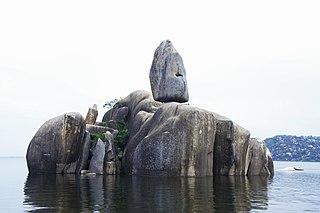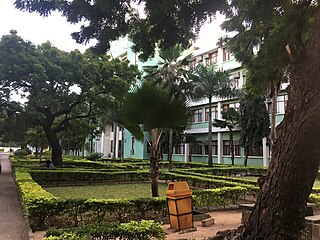
Mwanza City, also known as Rock City to the residents, is a port city and capital of Mwanza Region on the southern shore of Lake Victoria in north-western Tanzania. With an urban population of 1,182,000 in 2021, it is Tanzania's second largest city, after Dar es Salaam. It is also the second largest city in the Lake Victoria basin after Kampala, Uganda and ahead of Kisumu, Kenya at least in population size. Within the East African community, Mwanza city is the fifth largest city after Dar, Nairobi, Mombasa, and Kampala. It is slightly ahead of Kigali, Kisumu, and Bujumbura in the population of city proper limits. However, in terms of infrastructure, Kigali and Kisumu cities are way ahead of Mwanza. Mwanza city is also the capital city of Mwanza Region, and is administratively divided into two municipal districts within that Region - Ilemela and Nyamagana.

The National University Hospital (NUH) is a tertiary referral hospital and academic medical centre in Singapore, located in Kent Ridge. It is a 1,160-bed tertiary hospital serving more than 670,000 outpatients and 49,000 inpatients, and serves as a clinical training centre and research centre for the medical and dental faculties of the National University of Singapore (NUS).

Established in 1964, the Aga Khan Hospital, Dar es Salaam is a 170-bed multispecialty hospital. The hospital provides general medical services, specialist clinics and diagnostic services. It serves as a hub for several clinics around the city. It is also part of the Aga Khan Health Services international referral system, with links to the Aga Khan Hospital, Nairobi and the Aga Khan University Hospital, Karachi.

St. Augustine University of Tanzania (SAUT) is a private university in Mwanza, Tanzania. It was founded by the Catholic Bishops of Tanzania in 1998 as a secular, nonprofit, private institution. Before 1998, SAUT was called first Nyegezi Social Training Centre and then Nyegezi Social Training Institute. SAUT has over 10,000 students with an anticipated minimal rise each new academic year. The university attracts students from Tanzania and elsewhere, particularly Kenya, Uganda, Sudan, Ethiopia, Burundi, Malawi, Zambia, and recently Germany and other foreign nations. SAUT admits students of all nationalities and religious affiliations.

Muhimbili University of Health and Allied Sciences (MUHAS) is a public university in Dar es Salaam, Tanzania. It is accredited by the Tanzania Commission for Universities (TCU).
Anthony Petro Mayalla was a Tanzanian Archbishop of the Roman Catholic Archdiocese of Mwanza from his installation of February 28, 1988, until his death in 2009. Mayalla was also the founder of the Saint Augustine University of Tanzania (SAUT) and the Weil Bugando Medical Centre (WBMC).
NCBA Bank Tanzania Limited, is a merged bank between Commercial Bank of Africa (Tanzania) and NIC Bank Tanzania. It is a commercial bank in Tanzania licensed by the Bank of Tanzania, the central bank and national banking regulator.

India–Tanzania relations refers to the current and historical relations between India and Tanzania. India has a High Commission in Dar es Salaam, Tanzania has a High Commission in New Delhi, which is also accredited to Sri Lanka, Nepal, Bangladesh and Myanmar. Diplomatic relations are described as close, friendly and cooperative. 15,000 Indians visited Tanzania in 2007. In May 2011, Ex Prime Minister of India Manmohan Singh calls for strengthen cooperation with Tanzania. Trade between India and Tanzania amounted to 31 billion dollars in 2009–2010 and India is Tanzania's second-largest investor.

Roger Härtl is a board-certified neurological surgeon at Weill-Cornell Medical College and NewYork-Presbyterian Hospital. He is Director of Spinal Surgery at the Weill Cornell Brain & Spine Center in New York and the neurosurgeon for the New York Giants. Härtl has been named by Becker's Spine Review as one of the Top 50 Spine Surgeons in the United States as well as one of the Top 10 Spine and Neurosurgeon Leaders at Non-Profit Hospitals. He was named one of New York's Top Doctors by New York magazine after he saved the life of New York firefighter Eugene Stolowski, whose leap from a burning building left him critically injured.

The St. Francis University College of Health and Allied Sciences (SFUCHAS) is a constituent college of St. Augustine University of Tanzania,

Medical Stores Department (MSD) was established by the Act of Parliament No.13 of 1993 as an autonomous department under the Ministry of Health, Social Development, Gender, Elderly and Children responsible for develop, maintain and manage an efficient and cost effective system of procurement, storage and distribution of approved medicines and medical supplies required for use by the public health services as the Ministry of Health, Social Development, Gender, Elderly and Children may from time to time approve.
The Isaka–Kigali Standard Gauge Railway is a planned railway line linking the town of Isaka in Tanzania to the city of Kigali in Rwanda.
Mbarara Regional Cancer Centre (MRCC) is a public, specialized, tertiary care medical facility owned by the Uganda Ministry of Health. The facility is located along the Mbarara-Kabale Road, in the central business district of the city of Mbarara, on the campus of Mbarara Regional Referral Hospital. The coordinates of the centre are: 0°37'03.0"S, 30°39'17.0"E.
Arua Regional Cancer Centre (ARCC) is a public, specialized, tertiary care medical facility owned by the Uganda Ministry of Health. The facility is located off of Weatherhead Lane, in the central business district of the city of Arua, on the campus of Arua Regional Referral Hospital. This is located in the central business district of Arua, he largest city in the West Nile sub-region, approximately 476 kilometres (296 mi), by road, northwest of Kampala, the largest city in Uganda and its national capital. The coordinates of the cancer centre are: 03°01'06.0"N, 30°54'50.0"E.
The International Specialized Hospital of Uganda (ISHU) is a public, specialized, referral tertiary care medical facility under construction in Uganda. The hospital is expected to take two years to construct. The private developers who are constructing the hospital will operate it for ten years, then turn it over to the government of Uganda, in a public-private partnership arrangement.
Mbale Regional Cancer Centre (MbRCC) is a public, specialized, tertiary care medical facility owned by the Uganda Ministry of Health, intended to serve the Eastern Region of Uganda.
Butaro Hospital Cancer Center, or Butaro Cancer Centre of Excellence, is a public, specialized, tertiary care medical facility owned by the Rwanda Ministry of Health.

Ocean Road Cancer Institute (ORCI) is a public, specialized, tertiary care medical facility owned by the Tanzania Ministry of Health and Social Welfare. It is the largest comprehensive cancer center in the country.
Rajni Kanabar was an M.B.B.S. doctor and philanthropist belonging to the third generation of an Indian-origin family in Tanzania. He was the founder-chairman of Regency Medical Centre in Dar es Salaam, and the initiator-convenor of the Tanzania Heart Babies Project, which he established in the year 1979. Born in Mwanza, he was presented with the Pravasi Bharatiya Samman Award as a person of Indian origin, from the Government of India in 2010, for facilitating the surgeries of children in Tanzania suffering from congenital heart diseases. He also received the PBS Award Label from the High Commission of India in Tanzania in 2013, and the Order of the United Republic of Tanzania Medal in 2014.











